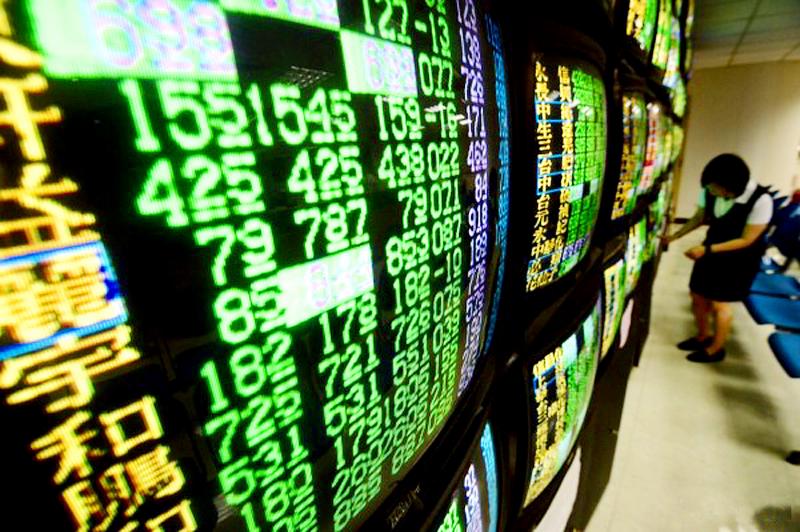The TAIEX yesterday closed below 16,000 points after eroding earlier gains, as many investors rushed to sell following an initial upturn, dealers said.
While the US Federal Reserve’s decision to increase its benchmark interest rate temporarily removed uncertainty from the markets, investors shifted their attention to the economy amid fears that rising rates would hurt market fundamentals, they said.
The TAIEX closed down 160.64 points, or 1 percent, at 15,838.61. Turnover totaled NT$272.345 billion (US$9.16 billion), with foreign institutional investors buying a net NT$647.96 million of shares on the main board, Taiwan Stock Exchange data showed.

Photo: Fang Wei-jie, Taipei Times
Led by contract chipmaker Taiwan Semiconductor Manufacturing Co (TSMC, 台積電), the TAIEX briefly rose above 16,200 points before many investors shifted to the sell side to lock up earlier gains by selling across the board, which brought the main board down to negative territory by the end of the session.
“The 75 basis-point rate increase by the Fed had been priced in after the global markets. In particular, the US markets encountered volatility in recent sessions amid rising inflation,” Hua Nan Securities Co (華南永昌證券) analyst Lu Chin-wei said.
“Although the rate hike decision removed market uncertainty for now, concerns are growing that higher borrowing costs will hurt the economy, as the Fed is expected to continue its rate hike cycle down the road,” Lu said.
TSMC, the most heavily weighted stock in the local market, saw earlier gains erased, but still closed above its previous closing level, rising 0.4 percent to NT$508, off a high of NT$516.
Soon after the local market opened, TSMC shares returned to the stock’s prior ex-dividend level by soaring by NT$9, indicating that investors remained upbeat about its sound fundamentals.
TSMC, which started to issue cash dividends on a quarterly basis instead of annually in 2019, saw its opening reference price cut by NT$2.75 from its previous close, as the company is to issue a NT$2.75 cash dividend per share for its earnings in the fourth quarter of last year. The payment is scheduled for July 14.
Old economy stocks were also affected by a retreat from their earlier gains, with the transportation sector falling 4.8 percent in the wake of a US government initiative to rein in fast-growing ocean cargo shipping rates, dealers said.
On Tuesday, US President Joe Biden said he would sign the Ocean Shipping Reform Act into law to make ocean shipping more efficient and lower costs as part of efforts to fight inflation.
The financial sector appeared resilient, closing little changed, as a rate hike is expected to expand banks’ interest spreads and boost their profitability, dealers said.
“With interest rates in the US on the rise, the US dollar is expected to remain stronger against the New Taiwan dollar, so the local equity market could continue to see liquidity flight as foreign institutional investors move their funds to US dollar-denominated assets,” Lu said.
“The silver lining is that funds managed by the government are likely to jump in as they did in recent sessions to prevent the TAIEX from falling too much,” Lu added.

To many, Tatu City on the outskirts of Nairobi looks like a success. The first city entirely built by a private company to be operational in east Africa, with about 25,000 people living and working there, it accounts for about two-thirds of all foreign investment in Kenya. Its low-tax status has attracted more than 100 businesses including Heineken, coffee brand Dormans, and the biggest call-center and cold-chain transport firms in the region. However, to some local politicians, Tatu City has looked more like a target for extortion. A parade of governors have demanded land worth millions of dollars in exchange

An Indonesian animated movie is smashing regional box office records and could be set for wider success as it prepares to open beyond the Southeast Asian archipelago’s silver screens. Jumbo — a film based on the adventures of main character, Don, a large orphaned Indonesian boy facing bullying at school — last month became the highest-grossing Southeast Asian animated film, raking in more than US$8 million. Released at the end of March to coincide with the Eid holidays after the Islamic fasting month of Ramadan, the movie has hit 8 million ticket sales, the third-highest in Indonesian cinema history, Film

Taiwan Semiconductor Manufacturing Co’s (TSMC, 台積電) revenue jumped 48 percent last month, underscoring how electronics firms scrambled to acquire essential components before global tariffs took effect. The main chipmaker for Apple Inc and Nvidia Corp reported monthly sales of NT$349.6 billion (US$11.6 billion). That compares with the average analysts’ estimate for a 38 percent rise in second-quarter revenue. US President Donald Trump’s trade war is prompting economists to retool GDP forecasts worldwide, casting doubt over the outlook for everything from iPhone demand to computing and datacenter construction. However, TSMC — a barometer for global tech spending given its central role in the

Alchip Technologies Ltd (世芯), an application-specific integrated circuit (ASIC) designer specializing in server chips, expects revenue to decline this year due to sagging demand for 5-nanometer artificial intelligence (AI) chips from a North America-based major customer, a company executive said yesterday. That would be the first contraction in revenue for Alchip as it has been enjoying strong revenue growth over the past few years, benefiting from cloud-service providers’ moves to reduce dependence on Nvidia Corp’s expensive AI chips by building their own AI accelerator by outsourcing chip design. The 5-nanometer chip was supposed to be a new growth engine as the lifecycle